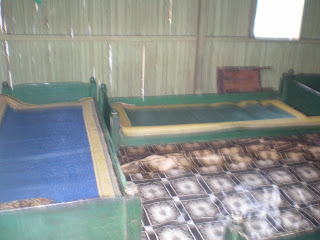I had been so excited about the opportunity to join in a Nigerian Field Society trip to the Makoko Stilt Village, an area that is visible briefly from the Third Mainland Bridge. But the scheduled trip had to be changed when a fierce thunderstorm arrived right at our scheduled departure time. I was really disappointed when they rescheduled the outing for a day when I had a previous commitment to attend a luncheon honoring the AWC's scholarship students. The student I'm sponsoring was making a 5 hour trip to Lagos to attend the luncheon, and I needed to be there to attend with him and also to give him his next installment payment on his scholarship. So, Brent went on the trip without me and I was glad to at least experience the Stilt Village vicariously through the pictures he took. It's a very interesting place.

The group traveled by boat to the Stilt village.

Boats are the only way to get around in this village, which is built on the water.

The group first had an audience with the Balle, the village chief. He told them about the challenges that face this community. The people who built this village came from the Republic of Benin, a French-speaking country that is a neighbor to Nigeria on the North. Many people living here, even the ones born here, just speak their native dialect and French. Most haven't applied for citizenship and the government doesn't really consider the community's problems to be their problems (not that the Nigerian government really has many worries about the concerns of the millions of poor people in this country). The government provides little, if any, services to the community.

The village has a new building to be proud of -- a community center and future school that is actually built on piles with sand fill. It was built with the support of a couple of Lagos expatriate groups. The school was recently completed and they are trying to get funding to provide some furniture before the school opens. They hope that the student fees will be able to pay for a teacher, so the community will be vested in keeping the school going. The village did put up the sum of 50,000 Naira (about $425) toward the building costs, which is a large sum for these very poor people. The school will be the only one in the village that will provide instruction in English.

After the meeting with the Balle, the group divided up to take tours of the area in local "banana boat" canoes.


There were lots of interesting peeks at the residents of the Stilt Village.





I'm assuming that the proximity of the water beneath all the houses means that it's a convenient toilet. Brent said that there is enough tidal flow in the water that it didn't smell like a sewer.

I don't know why the preview of this video isn't visible -- maybe because it's so brief. Brent didn't realize he was taking video here. But I think it's interesting to watch the children boat-hopping in the background. They are obviously very comfortable in these narrow canoes. There are no "streets" or passages between the houses in the village -- people can walk from house landing to house landing or take a boat if they have to go further. Privacy is obviously at a premium here.


This canoe is filling up tubs of drinking water to bring around to the houses -- it's a water boat.



Brent said that some sights here reminded him of the Floating Market we visited in Thailand. I can easily see why, though it's definitely not as pretty here.


The main industry of the village is, of course, fishing. And they do big business smoking the fish they catch. The picture above shows some stacks of wood ready to be burned in the smoker. We see these curled up smoked fish sold on the street, piled high in baskets on the heads of passers-by. (This picture of the fish I took earlier at the market.)


In this picture, this woman is getting ready to smoke some fish. They don't do any cleaning of the fish at all. After the fish is caught and brought to the village, they pierce it with a skewer so it stays in a rounded shape and then smoke it whole.

They enclose the building while smoking. Brent said that the smoke and odor of smoking fish is thick throughout the entire village.

They enclose the building while smoking. Brent said that the smoke and odor of smoking fish is thick throughout the entire village.

Boat building is also an important local business. These deeper canoes are used for carrying larger loads.






The sign on this building advertises mobile phone recharge cards. I wonder if there's any place so remote in Nigeria that you can't find somewhere to buy phone time for your cell phone.





The residents were curious to see the visitors, and the feeling was mutual.

Brent was on a boat with a visiting doctor, who was very interested to see the local maternity clinic.

Not many supplies in the clinic's pharmacy. The clinic staff showed the doctor a bag full of medication that somebody had dropped off for a donation. They had only a vague idea what many of the drugs were used for. The doctor advised them to not use some of the medications where they could do more harm than good.





No comments:
Post a Comment